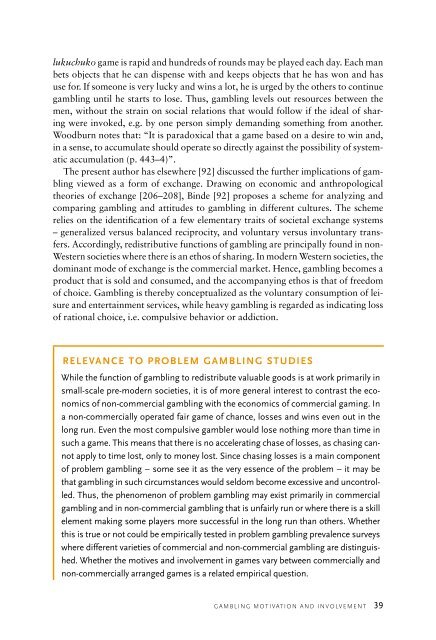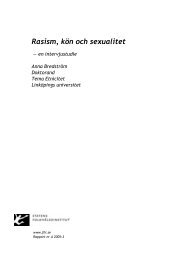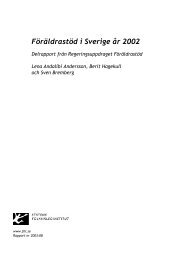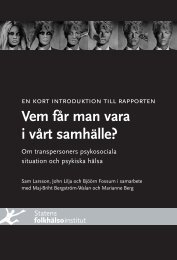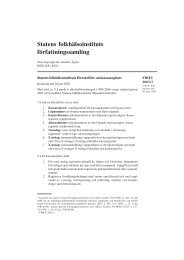Gambling motivation and involvement: A review of social
Gambling motivation and involvement: A review of social
Gambling motivation and involvement: A review of social
Create successful ePaper yourself
Turn your PDF publications into a flip-book with our unique Google optimized e-Paper software.
lukuchuko game is rapid <strong>and</strong> hundreds <strong>of</strong> rounds may be played each day. Each man<br />
bets objects that he can dispense with <strong>and</strong> keeps objects that he has won <strong>and</strong> has<br />
use for. If someone is very lucky <strong>and</strong> wins a lot, he is urged by the others to continue<br />
gambling until he starts to lose. Thus, gambling levels out resources between the<br />
men, without the strain on <strong>social</strong> relations that would follow if the ideal <strong>of</strong> sharing<br />
were invoked, e.g. by one person simply dem<strong>and</strong>ing something from another.<br />
Woodburn notes that: “It is paradoxical that a game based on a desire to win <strong>and</strong>,<br />
in a sense, to accumulate should operate so directly against the possibility <strong>of</strong> systematic<br />
accumulation (p. 443–4)”.<br />
The present author has elsewhere [92] discussed the further implications <strong>of</strong> gambling<br />
viewed as a form <strong>of</strong> exchange. Drawing on economic <strong>and</strong> anthropological<br />
theories <strong>of</strong> exchange [206–208], Binde [92] proposes a scheme for analyzing <strong>and</strong><br />
comparing gambling <strong>and</strong> attitudes to gambling in different cultures. The scheme<br />
relies on the identification <strong>of</strong> a few elementary traits <strong>of</strong> societal exchange systems<br />
– generalized versus balanced reciprocity, <strong>and</strong> voluntary versus involuntary transfers.<br />
Accordingly, redistributive functions <strong>of</strong> gambling are principally found in non-<br />
Western societies where there is an ethos <strong>of</strong> sharing. In modern Western societies, the<br />
dominant mode <strong>of</strong> exchange is the commercial market. Hence, gambling becomes a<br />
product that is sold <strong>and</strong> consumed, <strong>and</strong> the accompanying ethos is that <strong>of</strong> freedom<br />
<strong>of</strong> choice. <strong>Gambling</strong> is thereby conceptualized as the voluntary consumption <strong>of</strong> leisure<br />
<strong>and</strong> entertainment services, while heavy gambling is regarded as indicating loss<br />
<strong>of</strong> rational choice, i.e. compulsive behavior or addiction.<br />
RELEvancE tO pRObLEm GambLinG StudiES<br />
While the function <strong>of</strong> gambling to redistribute valuable goods is at work primarily in<br />
small-scale pre-modern societies, it is <strong>of</strong> more general interest to contrast the economics<br />
<strong>of</strong> non-commercial gambling with the economics <strong>of</strong> commercial gaming. In<br />
a non-commercially operated fair game <strong>of</strong> chance, losses <strong>and</strong> wins even out in the<br />
long run. Even the most compulsive gambler would lose nothing more than time in<br />
such a game. This means that there is no accelerating chase <strong>of</strong> losses, as chasing cannot<br />
apply to time lost, only to money lost. Since chasing losses is a main component<br />
<strong>of</strong> problem gambling – some see it as the very essence <strong>of</strong> the problem – it may be<br />
that gambling in such circumstances would seldom become excessive <strong>and</strong> uncontrolled.<br />
Thus, the phenomenon <strong>of</strong> problem gambling may exist primarily in commercial<br />
gambling <strong>and</strong> in non-commercial gambling that is unfairly run or where there is a skill<br />
element making some players more successful in the long run than others. Whether<br />
this is true or not could be empirically tested in problem gambling prevalence surveys<br />
where different varieties <strong>of</strong> commercial <strong>and</strong> non-commercial gambling are distinguished.<br />
Whether the motives <strong>and</strong> <strong>involvement</strong> in games vary between commercially <strong>and</strong><br />
non-commercially arranged games is a related empirical question.<br />
G A M B L I N G M O T I VAT I O N A N D I N V O LV E M E N T 39


